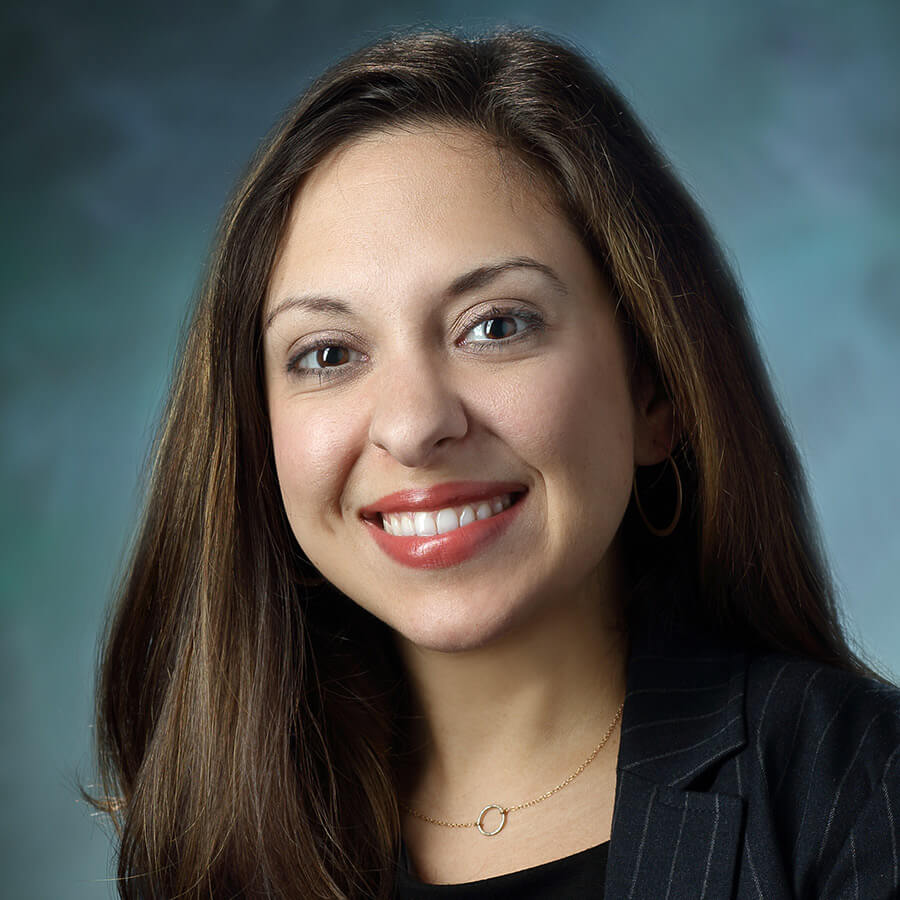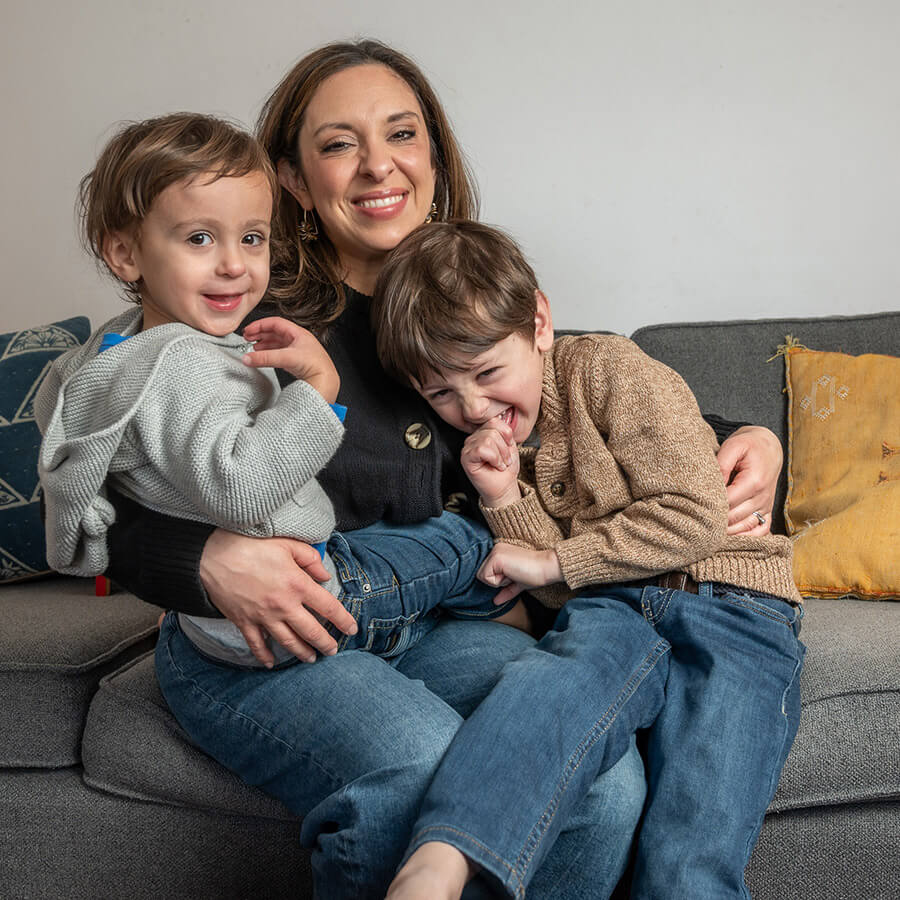'If We Don't Fight for Them, Who Will?'
Pediatric pulmonologist Christy Sadreameli advocates for public policies aimed at protecting vulnerable young lungs.

Dr. Christy Sadreameli with her sons
Photographer: Jennifer Bishop
As a pediatric pulmonologist at Johns Hopkins Children’s Center, Christy Sadreameli’s goal is to help her young patients with serious lung problems lead a normal life. “I want them running and playing again,” she says. “I want them to be able to breathe.”
To that end, she has become expert in treating asthma, cystic fibrosis and the pulmonary complications associated with sickle cell disease, as well as childhood interstitial lung disease, an umbrella diagnosis that encompasses more than 200 rare pediatric lung disorders. With pediatric immunologist Maria Gutierrez, Sadreameli founded and runs the interdisciplinary Childhood Interstitial and Immunological Disorders of the Lung (ChILD/Immune) Clinic. And she has doggedly pursued research related to some of her patients’ most complex conditions.
Yet, during her decade at Johns Hopkins Children's Center (she arrived as a pediatric pulmonary fellow in 2014 and was named assistant professor of pediatrics in 2016), Sadreameli has come to play yet another vital role: as advocate for public policies that make healthy lungs possible.
A volunteer national spokesperson for the American Lung Association and chair of an advocacy committee for the American Thoracic Society, Sadreameli does interviews, op-eds and podcasts to educate the public on issues ranging from the dangers of vaping and smoking to the importance of clean air, both indoors and out. She has also successfully lobbied for a host of causes critically important to her patients’ lung health, from convincing Medicaid to cover crucial preventive asthma drugs to persuading the Maryland legislature to pass a new law (the result of a five-year effort) requiring schools to stock the asthma emergency drug albuterol.
In her paper, “Advocacy and Health Equity: The Role of the Pediatric Pulmonologist,” published in Clinics in Chest Medicine in September, she argues that all pediatric pulmonologists should consider partnering with nonprofit advocacy groups to advance public policies most likely to protect vulnerable young lungs.
“We’re the ones who really understand the impact that climate change, air pollution, smoking and vaping, and the unavailability of lifesaving drugs have on children,” she says. “So if we don’t fight for them, who will?” In the interview that follows, Sadreameli talks about her passionate — and sometimes frustrating — advocacy journey.
Q: What drew you to advocacy work?
 Pediatric pulmonologist Christy Sadreameli
Pediatric pulmonologist Christy SadreameliI was a volunteer media spokesperson for the American Lung Association, and in 2017, had the opportunity to get some training in translating my medical knowledge into language that’s easy for people to understand. I really loved it — and still do. I was also involved with the American Thoracic Society, and they wanted someone to start a national advocacy committee for pediatrics. They asked me to be chair. I didn’t think I had enough advocacy experience, but I took a leap of faith and the whole thing just took off. We’ve been able to pass laws in multiple states, including Maryland, enabling schools to stock the emergency asthma drug albuterol. And we’ve interfaced with government agencies like the EPA and the FDA and even Congress to work on clean air, tobacco regulation and drug policies that affect children with lung problems.
I am also now the mother of two boys, ages 2 and 5, and having children of my own has only increased my desire to advocate for all kids so they can have the healthiest childhood possible, whether or not they have a lung disease.
Q: Why should pediatric pulmonologists do advocacy?
It’s actually a perfect fit. Who understands the impact of e-cigarettes and tobacco, air pollution and wildfires on the lungs of young people better than we do? I now have a bench of pediatric pulmonologists from all over the country I can call upon to offer expert testimony and advice on these issues, which is really cool, and it’s continuing to grow. Plus, I’m hearing more from residents and fellows interested in advocacy. It’s exciting work, and I hope it will attract more young people to pediatric pulmonology because as a lung expert, you can be a really effective advocate on a whole range of important issues — from health inequities to climate change.
Q: What are the challenges you face as an advocate? Evidently your recent op-ed in the Baltimore Sun, “Diesel Trucks Are Disastrous for Children’s Health,” got some fierce pushback from the industry.
I struggle with this a lot. One of the biggest challenges is that I feel so small in the face of industry. Consider the case of Flovent, the lifesaving asthma drug that children have been taking successfully for decades. Flovent has suddenly been discontinued because of a policy change, and we are facing a crisis.
It’s all about money, as I explained in my recent op-ed in U.S. News & World Report. So, over the past year, we have been working nonstop on this issue. I’ve met with GSK, the drug company that made Flovent, but when so much money is involved, it feels very hard to move the needle. And it’s very frustrating because we are trained as doctors to look at the child and think about what’s best and healthiest for the child. My patients and their parents don’t want to hear that it costs your insurance company too much money, and that’s why insurance won’t cover this drug that keeps you breathing.
Q: What would you like policymakers and the public to know about lung disease in children?

I think all kids deserve to breathe clean and healthy air. They deserve adequate treatment for the lung conditions they have, and their families should have access to treatments and be able to afford them. Insurance companies shouldn’t dictate who gets what. I also think healthy lungs in adulthood begin in childhood, and some of this we have control over and some we don’t. You can’t control, for instance, whether you’re born with a genetic disease that leads to lung issues. But we should be able to start treating your condition — cystic fibrosis, for example — at a young age to ensure the healthiest possible outcome.
So, I’m very focused on childhood, not only so kids can run and play and have a normal life, but so they can make it to adulthood and have the best breathing possible.
